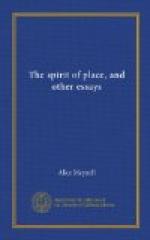Education might do somewhat to control the personal habits for which ungenerous observant men are inclined to dislike one another. It has done little. As to literature, this has had the most curiously diverse influence upon the human sensitiveness to habit. Tolstoi’s perception of habits is keener than a child’s, and he takes them uneasily, as a child does not. He holds them to be the occasion, if not the cause, of hatred. Anna Karenina, as she drank her coffee, knew that her sometime lover was dreading to hear her swallow it, and was hating the crooking of her little finger as she held her cup. It is impossible to live in a world of habits with such an apprehension of habits as this.
It is no wonder that Tolstoi denies to other men unconsciousness, and even preoccupation. With him perception never lapses, and he will not describe a murderer as rapt away by passion from the details of the room and the observation of himself; nor will he represent a theologian as failing—even while he thinks out and decides the question of his faith—to note the things that arrest his present and unclouded eyes. No habits would dare to live under those glances. They must die of dismay.
Tolstoi sees everything that is within sight. That he sees this multitude of things with invincible simplicity is what proves him an artist; nevertheless, for such perception as his there is no peace. For when it is not the trivialities of other men’s habits but the actualities of his own mind that he follows without rest, for him there is no possible peace but sleep. To him, more than to all others, it has been said, “Watch!” There is no relapse, there is no respite but sleep or death.
To such a mind every night must come with an overwhelming change, a release too great for gratitude. What a falling to sleep! What a manumission, what an absolution! Consciousness and conscience set free from the exacted instant replies of the unrelapsing day. And at the awakening all is ready yet once more, and apprehension begins again: a perpetual presence of mind.
Dr. Johnson was “absent.” No man of “absent” mind is without some hourly deliverance. It is on the present mind that presses the burden of the present world.
SHADOWS
Another good reason that we ought to leave blank, unvexed, and unencumbered with paper patterns the ceiling and walls of a simple house is that the plain surface may be visited by the unique designs of shadows. The opportunity is so fine a thing that it ought oftener to be offered to the light and to yonder handful of long sedges and rushes in a vase. Their slender grey design of shadows upon white walls is better than a tedious, trivial, or anxious device from the shop.




